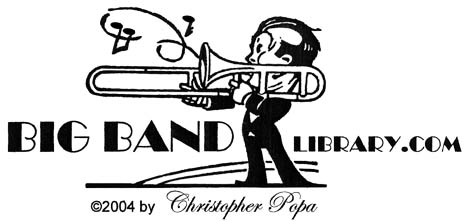
Osborne also composed, in the late '30s and early '40s, several tunes, including Pompton Turnpike, Between 18th and 19th On Chesnut Street, and Missouri Scrambler, which, curiously, became more associated with the bands of other leaders.
vital stats:
given name William Osborne Oliphant
birth Nov. 25, 1905? (or 1906?), Toronto, Ontario, Canada
death Oct. 22, 1981, Santa Monica, CA, "cardiopulmonary arrest . . . long-term vascular
disease and severe dementia"
father William Galbraith Oliphant
mother Ella Oliphant
wife
education St. Andrew's College, Aurora, Ontario, Canada
memberships ASCAP, 1941-
His first recordings were made for Columbia, in 1929. He recorded extensively for Melotone from 1931-35, then was signed with Decca from 1936-39 and with Varsity in 1939-40.
Violinist Gerald "Jerry" Bittick was credited with writing the "slide music" charts for Osborne.
Osborne's most popular records included Cocktails for Two, That's What You Think, and It's De-Lovely.
While on tour, he and his band performed at many opulent hotels, such as the Edgewater Beach in Chicago, the Book-Cadillac in Detroit, the Lowry in St. Paul, and the Hotel New Yorker, Manhattan Towers, and Lexington Hotel around New York City.
Harry Fromm, who managed Osborne's publicity and business affairs, saw to it that the group always had a commercial radio sponsor, such as Karo Syrup, the Gruen Watch Company, or Mazola Salad Oil.
They were also heard over the radio on "The Abbott and Costello Show" and appeared with the comedy team in the 1944 Universal motion picture "In Society."
Among the featured performers with Osborne's band were a brother and sister, vocalists Dick and Dorothy Rogers.
In late 1940, Osborne retired and turned his ensemble over to Dick Rogers. But in 1942 he formed a new orchestra, which made its final records for the Black and White label in 1946 featuring vocalist Eileen Wilson, then disbanded following one more return to the Edgewater Beach Hotel in Chicago in 1948.
During the remaining years of his life, Osborne operated a talent agency in southern California.
sources:
"Bandleader Will Osborne," Los Angeles Times, Oct. 26, 1981, p.B21.
Joseph E. Bennett, "Listen to the Glissin': The Will Osborne Story," Joslin's Jazz Journal,
August 2001, p.4+.
Charles Garrod, Will Osborne and His Orchestra (Zephyrhills, FL: Joyce Record Club,
1991).
"Osborne, Will," in ASCAP Biographical Dictionary, Fourth Edition (New York City:
Jacques Cattell Press, 1980), p.380.
Joel Whitburn, Pop Memories 1890-1954: The History of American Popular Music
(Menomonee Falls, WI: Record Research Inc., 1986), p.345.
I would like to expand this tribute, if possible, with a new interview of someone who was important to Will Osborne's life and career. Are you an alumnus of his band, a member of his family, or a collector who is knowledgeable about his accomplishments? Please contact me via e-mail
return to "Biographical Sketches" directory
go to Big Band Library homepage
The big bands are back
in a new and exciting way!
WILL OSBORNE
"ON WITH THE DANCE"
by Music Librarian CHRISTOPHER POPA
August 2008
On the radio, people were invited to listen "to the glissin' of the slide trombone," which gave his band its distinctive style. In fact, in 1935 his six-man brass section employed three (slide) trombones and three (slide) cornets.
Starting out as a drummer, Osborne had also become known for his singing, drawing in the late 1920s some comparisons with the then-current rage, Rudy Vallee.
